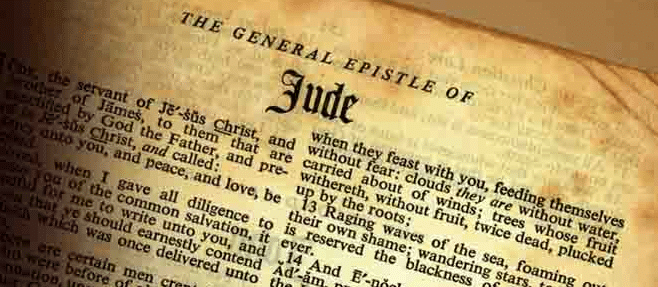The book of Jude is one of the shortest books in the New Testament, containing only one small chapter. Yet, even in these few lines, Jude manages to add to the vast biblical testimony of the deity of Christ. It is clear, even in this tiny letter, that the earliest Christians confessed Jesus to be the one true God and believed in even in this tiny letter, that the earliest Christians confessed Jesus to be the one true God and believed in the biblical doctrine that would come to be known as the Trinity.

Jesus is Jehovah God
In verse 4, Jude writes:
“For certain persons have crept in unnoticed, those who were long beforehand marked out for this condemnation, ungodly persons who turn the grace of our God into licentiousness and deny our only Master and Lord, Jesus Christ,” (Jude 4).
Take careful note of the final phrase in this verse: “deny our only Master and Lord, Jesus Christ.” The word here for Master is the Greek “despotas” and the word for Lord is “kurios.” Despotas is the word from which we get English words like “despot”, “despotic,” and “despotism.” It is a word that reflects absolute authority or even ownership. It was a word used for the head of a household or the head of a state who ruled with supreme authority as if the nation was his household.1 It must be understood that in Roman culture, the head of a household had complete and total authority. He could even legally put his own children to death simply because their behavior displeased him, even if his children were already adults and living on their own2 (to say nothing of what he could do to his slaves3). The term “despotas” thus reflects absolute power. Jews frequently referred to God as despotas and spurned the idea of bowing their knee to any other person as despotas.4 It is significant, then, that Jude refers to Jesus as “our only despotas.” The Greek word “kurios” is a bit broader in use than “despotas,” but is certainly another word for “master” or Lord. It was used in the Septuagint (an ancient Greek translation of the Hebrew Scriptures) as a substitute for YHWH (The divine name of God: Yahweh, or Jehovah). It was also, of course, a word used for various human masters as well. Neither of these words are inherently a divine name, but it is very difficult to imagine a Jewish writer referring to any human ruler as “our ONLY Master [despotas] and Lord [kurios].” At the very least, using both of these words together and saying that Jesus is the only one is the highest possible expression of Jesus’ absolute authority and power. When we place Jude’s words in context, it is clear that He is saying that Jesus is divine. The very next verse reads:
“Now I desire to remind you, though you know all things once for all, that the Lord, after saving a people out of the land of Egypt, subsequently destroyed those who did not believe,” (Jude 5)
These are literally Jude’s very next words right after saying that Jesus is our only Master and Lord. He confesses Jesus as the only Lord, then reminds them that the Lord saved the people out of Egypt and judged those who didn’t believe. It is simply unimaginable that Jude would switch to calling someone else the Lord in the same breath as saying that Jesus is the only Master and Lord. In fact, many of the earliest manuscripts don’t even use the title “Lord” in verse 5, but actually use the personal name of Jesus! This is reflected in translations like the ESV:
“Now I want to remind you, although you once fully knew it, that Jesus, who saved a people out of the land of Egypt, afterward destroyed those who did not believe,” (Jude 5 ESV)
There is actually a very strong case for the idea that “Jesus” is the original reading here rather than “Lord.” Even if we assume that Lord is the original reading, however, the fact that we find “Jesus” in place of “Lord” in these very early manuscripts points to the fact that the earliest Christians understood the “Lord” in verse 5 to be Jesus, as the context clearly demands. But this must mean that Jesus is the Lord who delivered Israel from Egypt. As we read on, it also means that Jesus is the Lord who judged the fallen angels and destroyed Sodom and Gomorrah. Indeed, the whole passage would unquestionably mean that Jesus is Jehovah God of the Old Testament.
Of course, those who disbelieve this conclusion make every attempt to divide these verses. For example, the New World Translation of the Jehovah’s Witnesses reads for these two verses:
“My reason is that certain men have slipped in among you who were long ago appointed to this judgment by the Scriptures; they are ungodly men who turn the undeserved kindness of our God into an excuse for brazen conduct and who prove false to our only owner and Lord, Jesus Christ. Although you are fully aware of all of this, I want to remind you that Jehovah, having saved a people out of the land of Egypt, afterward destroyed those not showing faith,” (Jude 4-5, NWT)
Notice that even here Jesus is called “our only owner and Lord.” In verse 5, however, they break the connection by translating “kurios” as the personal name “Jehovah” instead of the title “Lord.” As I previously mentioned, there are indeed early manuscripts that replace “kurios” with a personal name in this verse, but ironically it is the name “Jesus” rather than “Jehovah.” The NWT translators are acting on ideology here rather than any evidence in the text itself. Jude calls Jesus our only despotas and kurios. He then goes on to talk about “the kurios”, and does so in a way to show this kurios acting as a despotas. The Kurious is using His supreme authority to mete out judgment and even put to death those who are acting against His commands. To change “the kurios” of verse 5 into a different “kurios” than the one in verse 4 completely destroys the entire flow of the argument in the text. The evidence in the grammar, in the flow of the context, and in the early manuscripts all point together in one direction: Jesus is the Lord of verse 5, which means that Jesus is Jehovah.
Jude and the Trinity
Jude not only reflects a clear belief in Jesus as Jehovah, but he does so in a Trinitarian fashion. Jude clearly distinguishes God the Father and Jesus from one another in verse 1 and again in verse 25. Jude even gives a fully Trinitarian admonition to his readers in verses 20-21:
“But you, beloved, building yourselves up in your most holy faith and praying in the Holy Spirit, keep yourselves in the love of God, waiting for the mercy of our Lord Jesus Christ that leads to eternal life,” (Jude 20-21)
Jude clearly distinguishes between the Father, Son, and Holy Spirit. He presents all three as present and active, and our holy faith unto eternal life is reliant on each of these divine persons. Everything in Jude points to a monotheism consistent with the rest of scripture. He is not teaching three separate deities. Jude believes in one God. Yet he speaks of this monotheistic devotion in terms of the Father, Son, and Holy Spirit as three distinct persons. Jude is, thus, writing as a consistent Trinitarian. He is communicating the same faith Christians have always communicated; that there is one God who exists in three distinct, co-equal, and co-eternal persons. This one Trinitarian God is the object of what Jude himself calls the faith “once for all delivered to the saints.”
References
| 1↑ | Richard Bauckham, Jude and the early relative of Jesus in the Early Church (T&T Clark, 1990) 303-304 |
|---|---|
| 2↑ | Jo-Ann Shelton, As the Romans Did: 2nd Edition (Oxford University Press, 1998) 17 |
| 3↑ | ibid, 173-174 |
| 4↑ | Richard Bauckham, Jude and the early relative of Jesus in the Early Church (T&T Clark, 1990) 304 |






